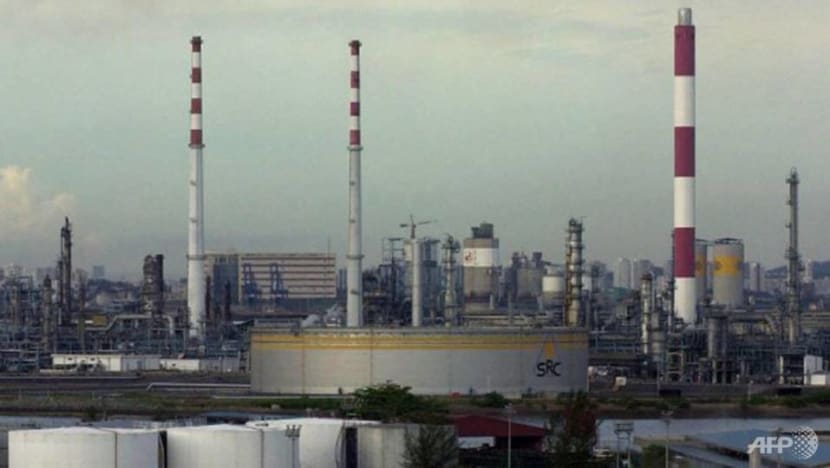ExxonMobil's Singapore layoffs highlight global pressures on oil and gas sector: Analysts
The petrochemical sector is struggling with weakening demand, overcapacity and a global pivot towards cleaner energy, analysts point out.

Chemical refineries in Singapore. (Photo: AFP)

This audio is generated by an AI tool.
SINGAPORE: ExxonMobil’s decision to cut up to 500 jobs in Singapore signals wider industry challenges from declining demand and rising supply, analysts said.
The US energy giant on Wednesday (Oct 1) said it plans to reduce 10 to 15 per cent of its workforce in Singapore by end-2027, calling it a move to improve competitiveness in an “ever-evolving landscape” and to "position the business for future success".
The announcement followed a global restructuring plan unveiled a day earlier, which will see the company laying off 2,000 jobs worldwide, or 3 to 4 per cent of its workforce.
Analysts pointed out that ExxonMobil's cuts reflect broader challenges across the sector.
“It's a demand-supply story affecting international oil and gas companies,” said energy consultant Tilak Doshi.
“Crude oil prices are down, margins are down, revenues are down … So how do they respond to it? By cutting back.”
Other major US oil companies, including Chevron and ConocoPhillips, have announced job cuts this year, as Brent crude prices fell by about 12 per cent this year, driven by rising OPEC+ supply.
The sector is also facing weakening demand and overcapacity, particularly with the growth of petrochemical plants in China, said former Energy Studies Institute visiting senior fellow Leow Foon-Lee.
Singapore is not insulated from these challenges, given its role as a regional refining hub, he said.
Beyond oil demand and supply, companies also face uncertainties from trade tariffs and pressures to restructure as artificial intelligence reshapes operations, said Mr Leow, who is also an adjunct professor at Nanyang Technological University's business school.
SHIFT TO GREEN ENERGY
Besides ExxonMobil, other oil giants in Singapore have cut back their businesses in recent years.
In May last year, Shell sold its Bukom refinery in Singapore – one of the world’s largest oil refining and trading centres – to Indonesian firm PT Chandra Asri and Swiss-based Glencore, having earlier announced plans to cut 500 jobs over three years.
Structural shifts in the industry are being driven by the global transition to cleaner energy, automation and stricter regulations, said Dr Roger Fouquet, principal research fellow at the Energy Studies Institute at the National University of Singapore.
Singapore, like other parts of the world, is moving towards deploying cleaner energy with a goal of achieving net-zero carbon emissions by 2050.
The country was the first in Southeast Asia to implement a carbon tax in 2019. Businesses that emitted more than 25,000 metric tonnes of greenhouse gas a year had to pay S$5 (US$3.90) per tonne of carbon dioxide equivalent produced.
This tax was raised to S$25 per tonne of emissions in 2024, and will eventually be raised to S$50 to S$80 by 2030.
Analysts stressed, however, that current layoffs are tied more to demand and supply than to carbon policy.
SINGAPORE'S EVOLVING ROLE
Despite the turbulence in the industry, analysts said Singapore's petrochemical hub role is not diminishing but evolving.
"The rationalisations are paving the way for a more resilient … and future-driven market and environment,” said Mr Timo Tumuscheit, vice-president of business development for chemicals at Argus.
He said Singapore is “moving up the value chain” by focusing on more specialty chemicals, which are higher-value, produced in smaller quantities and tailored for specific functions.
Momentum is also building around biochemicals, carbon capture and low-carbon fuels, which reflect the region's shift towards more sustainable energy systems.
Although Singapore is now a hub for liquefied natural gas and bunker fuel, the fuel mix will change to cleaner fuels in future, said Mr Leow.
“And so our role has not changed. It's just the fuel mix has changed,” he added.
Mr Tumuscheit agreed: “Singapore, as a petrochemical hub, will always remain a major player and an important hub in the region and globally.”

















